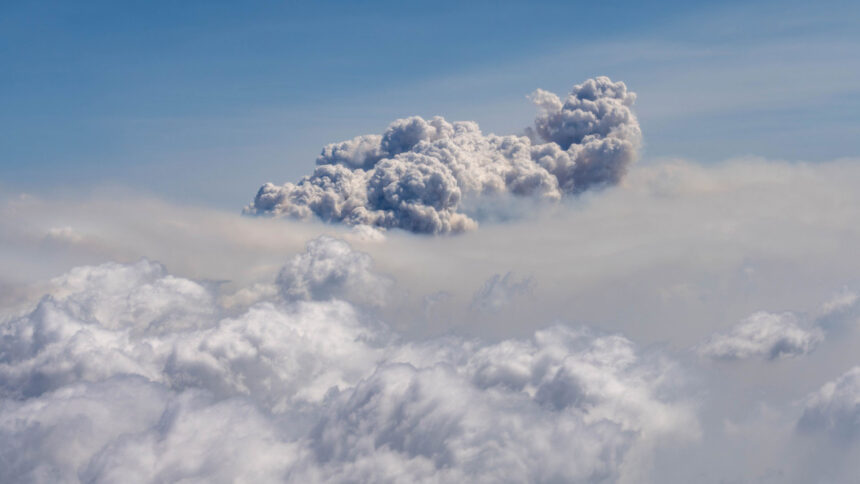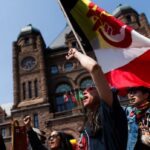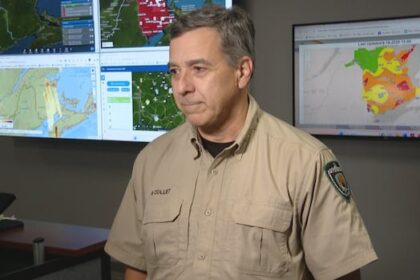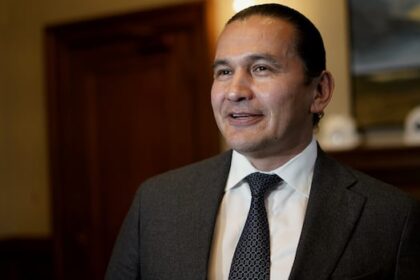Wildfires have forced another 1,000 people to flee their homes in Manitoba. The town of Snow Lake, near Flin Flon, has issued a mandatory evacuation order for its residents as a large wildfire threatens the area. That fire, which has now grown to more than 3,000 square kilometres, has already forced out all 5,000 residents of the city of Flin Flon and a thousand more in surrounding cottages and homes. When the Snow Lake evacuees are added in, Manitoba has about 19,000 out of their homes. There are 27 total fires in the province, eight of them out of control. Government officials said that more than 1,700 hotel rooms in the province have been assigned to evacuess with 200 rooms still available and another 200 more that will become available in the coming days. About 360 evacuees were still in temporary shelters on Thursday morning said the government. “Because of the huge scale of this crisis, we did open congregate shelters to provide immediate safety,” said Lisa Naylor, Emergency Management minister in Manitoba. “However as policy, Manitoba aims to provide hotel rooms for all evacuees. Now, the majority of evacuees are in hotel rooms or with friends and family.” Evacuees take refuge in Niagara Falls, Ont. Until two weeks ago, Tyrone Caribou and his five children lived together in a house on a remote First Nation reserve in northern Manitoba. Then the scorching wildfires tearing through the Prairies blanketed the region in thick smoke and split his family across two provinces. Caribou and his 15-year-old daughter, Rosa Caribou, were part of a cohort of evacuees brought to Niagara Falls, Ont., while his other children are staying in Thompson, Man., — three with a relative and one, his 19-year-old daughter, with her boyfriend, he said. “We’re displaced all over. We got out as soon as we could,” Caribou said this week, standing outside the downtown hotel where he and his daughter settled three days ago. Wildfires also forced the family from their home in Pukatawagan, part of Mathias Colomb Cree Nation, in 2022, but Caribou’s late wife, who he described as the “glue” of the family, was around back then to keep everyone together, he said. Caribou had to leave the region due to his asthma, he said, and only Rosa chose to accompany him as the others stayed behind. The two of them boarded a small plane at the local airport in Pukatawagan, which shut down soon after due to the encroaching blaze, Rosa said. Her siblings, meanwhile, took refuge at a youth centre until they could be taken away by helicopter, she said. “There was a lot of burnt trees and a lot of smoke,” Rosa said, describing the scene from the air. “It was very emotional, seeing that the way it was and not knowing if you’re going to be able to go back home.” The two are among some 2,000 Manitoba residents who have taken refuge in Niagara Falls after fleeing wildfires raging in their province. Evacuees have been put up in five hotels near tourist attractions and the iconic Horseshoe Falls, with around 1,000 more expected to arrive in the coming days, officials in charge of the evacuation operation said. More than 18,000 people have been displaced due to the wildfires in Manitoba since last week, including 5,000 residents of Flin Flon near the Saskatchewan boundary, along with members from at least four First Nations. Members of the Royal Canadian Air Force help evacuees board a C-130 Hercules aircraft in Norway House, Man., Tuesday, June 3, 2025, at the Norway House Airport as crews continue to fight wildfires in northern Manitoba. Photo: David Lipnowski/The Canadian Press. Some residents from Pimicikamak Cree Nation, east of Flin Flon, were taken to Niagara Falls on Sunday, with more arriving since then. Graham Colomb, from Mathias Colomb Cree Nation, was evacuated by helicopter from the reserve. Seeing the destruction from the sky left him heartbroken, he said. “I was devastated, man, devastated seeing all that go up in flames. It was hard to see,” he said. Some evacuees said they’re grateful for the hospitality but worry they won’t have a home to return to once the flames die down. “It’s pretty good, everything’s provided for us,” from meals and snacks to medical care for those who need it, he said. While he doesn’t have a house of his own and was living with a relative, Colomb said he’s unsure that home will still be standing when they return. “What I’m worried about is when we go back, I’m hoping that we still have a roof,” he said. Kelly Ouskun’s family of six also had no choice but to leave everything behind. He first drove about 145 kilometres from Split Lake to Thompson, then flew to Niagara Falls. He said he saw so much fire and smoke along the highway that he felt “nauseated.” “It made me feel a little off and … my eyes were hurting, feel it in the chest, and I just seen a lot of our reserve area burned,” he said, his children playing around him. “It’s pretty sad, seeing it like that.” Ouskun said he has heard the homes on the reserve where he lives, including his own, are still standing, and he hopes that will continue to be the case. For many, the evacuation represents their first visit to one of the country’s top tourist destinations, and the opportunity to see the sights offers a small silver lining to the upheaval. Adolphe Thomas, who fled Cross Lake with his family, went to see the falls at night and was planning to go back in the daytime, he said. He described the view as “awesome.” Colomb, from Mathias Colomb, said he was trying to convince some of the others to come along on a boat ride to get a closer look at the falls. For Caribou and his daughter, the feeling of being away from home brought a mix of excitement and concern. Rosa saw the falls for the first time and loved seeing the rainbow form over the Niagara River, the teen said. “I really like it. There’s lots out here to experience,” she said. But her father said he was counting days until they could go back home and reunite the family. “I’m very worried,” Caribou said. “… I miss Pukatawagan, that is our home. It feels different here.” People charged in Saskatchewan Saskatchewan Premier Scott Moe told a news conference that two people have been charged with setting wildfires. He said one of them was charged in relation to a fire around La Ronge, which has forced 7,000 people to flee their homes. “The RCMP have informed us that they have now charged a couple of individuals,” Moe said. RCMP did not immediately respond to a request for comment. Saskatchewan has 24 active wildfires that have forced between 10,000 and 15,000 people from their homes. “Many if not virtually all of the fires that we’re dealing with in Saskatchewan, although not intentionally, are human caused. Some of those have been intentionally human caused,” Moe said. Continue Reading
Wildfires force out another 1,000 residents in Manitoba

Leave a Comment










